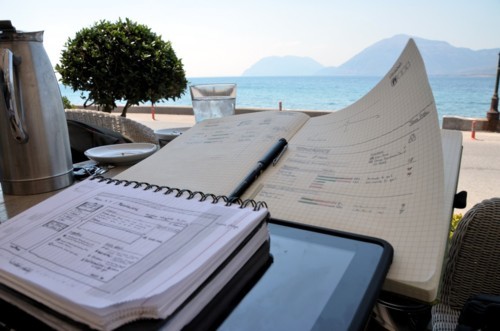mini-posts
- Today’s exploration: Beauty
“In its most profound sense, beauty may engender a salient experience of positive reflection about the meaning of one’s own existence.” [article, video]
- Quote: On Teams
“I enjoy a working environment where the word ‘team’ is uttered in derision, and view the process of team or community as a result of mutual respect and enlightened self interest as opposed to a management method where fuzzy feelings are elicited to get the benefits and delegate the blame.” (comment by dkite on LWN article)
- Skype wows
Calling to Greek landline phones (both in-town and country-wide) is cheaper with Skype than Forthnet. Yay for N900 handling all my local calls then.
- Greetings.
“To the past, or to the future. To an age when thought is free. From the Age of Big Brother, from the Age of the Thought Police, from a dead man… greetings.” (1984)
- Rock Paper Scissors Spock Lizard
“Scissors cuts Paper covers Rock crushes Lizard poisons Spock smashes Scissors decapitates Lizard eats Paper disproves Spock vaporizes Rock crushes Scissors.” (via @mperedim)
-
The Greek Crisis
A lot of friends abroad ask me the same question: "What has led up to the current financially hard situation in Greece?". I found this excellent article from NY Times called "Can Greeks Become Germans?", which summarizes the problem in a very detailed way. I'll quote some large sections here, for reference.
[...] Germany is the epitome of a country that made itself rich by making stuff. Greece, alas, after it joined the European Union in 1981, actually became just another Middle East petro-state — only instead of an oil well, it had Brussels, which steadily pumped out subsidies, aid and euros with low interest rates to Athens.
Natural resources create corruption, as groups compete for who controls the tap. That is exactly what happened in Greece when it got access to huge Euro-loans and subsidies. The natural entrepreneurship of Greeks was channeled in the wrong direction — in a competition for government funds and contracts. To be sure, it wasn’t all squandered. Greece had a real modernization spurt in the 1990s. But after 2002, it put its feet up, thinking it had arrived, and too much “Euro-oil” from the European Union went back to financing a corrupt, patrimonial system whereby politicians dispensed government jobs and projects to localities in return for votes. This reinforced a huge welfare state, where young people dreamed of a cushy government job and everyone from cabdrivers to truckers to pharmacists to lawyers was allowed to erect barriers to entry that artificially inflated prices.
European Union membership “was a big opportunity for development, and we wasted it,” explained Dimitris Bourantas, a professor of management at Athens University. “We also did not take advantage of the markets of the [formerly] socialist countries around Greece. And we also did not take advantage of the growth of the global economy. We lost them all because the political system was focused on growing public administration — not on [fostering] entrepreneurship, competition or industrial strategy or competitive advantages. We created a state with big inefficiencies, corruption and a very large bureaucracy. We were the last Soviet country in Europe.”
That is why, he added, that Greeks, when they move to the U.S., “unleash their skills and entrepreneurship” in ways that enable them to thrive in commerce. But here in Greece, the system encourages just the opposite. Investors here tell you that the red tape involved in starting a new business is overwhelming. It’s crazy; Greece is the only country in the world where Greeks don’t behave like Greeks. Their welfare state, financed by Euro-oil, has bred it out of them.
With the decline of Beirut and Dubai, Athens should have become the service center of the Eastern Mediterranean. Instead, Cyprus and Istanbul seized that role. Greece must not waste this crisis. While it has instituted some reforms in the last year, Prime Minister George Papandreou said to me, “What is most frustrating is the resistance in the system. How do you produce a change in culture?”
It will take a cultural revolution. And that can happen only if Greece’s two major parties come together, hold hands, and collectively force through a radical change in the governing culture from the top down. Without that, Greece will never be able to pay back its loans.
Update 6 Mar 2012: Following my respectful discource policy, I've annotated some flamebait parts of the comments on this thread. I don't like removing comments or moderating, so I chose to annotate and link to the relevant post where further information and discussion can take place.
-
Quote
If @transifex ever entered the Linux desktop, the first thing I'd translate would be "λσ -λα bash: λσ: command not found..."
— https://twitter.com/#!/glezos/status/93335171264286721
-
Text

Brainstorming design mockups at summer seaside café
-
youtube.com
Thumbs up if you're watching this in 2023 and you're a time traveler.
— Comment on YouTube video
-
Mashable
Greece was the ultimate bubble, and most of society was content with that — the promise of stress-free living was impossible to pass up. Over the years, I witnessed the powers-that-be strip away all mechanisms of entrepreneurship, risk and innovation in favor of the alternatives: a bloated public sector and a guaranteed employment structure. [...]
If I can take away one thing from my experience here and ingrain it into Greek society, it would be to move toward uncertainty, embrace the challenges ahead and find the joy in solving the problems of the present day. We need to drop the cynicism, forget the past indiscretions of our leaders (we are all guilty to some degree or another) and band together, roll up our sleeves and get to work.
The web is a force of nature unlike anything we have ever seen, and we need to recognize that tapping into this force requires trial and error. It is part of the game, and entrepreneurs play the game well.
— Alex Christoforou (@alexwadja) on Mashable
-
Quote
A woman's shoulders are the front lines of her mystique, and her neck, if she's alive, has all the mystery of a border town. A no-man's land in that battle between the mind and the body.
— John Milton, The Devil's Advocate
-
Quote
So I guess this is where I tell you what I learned - my conclusion, right? Well, my conclusion is:
Hate is baggage. Life's too short to be pissed off all the time. It's just not worth it.
— Danny Vinyard, American History X
-
Quote
Arrived in San Francisco. My startup's value just doubled.
—
-
Keynote at the MeeGo Conference
I had the privilege to be invited to the opening keynote talk at the recent MeeGo Conference in San Francisco. Jim Zemlin, the Director of Linux Foundation, called me on stage to talk about MeeGo Localization and the acceleration of MeeGo's availability in dozens of markets around the world we achieved with Transifex.
Here's the full video clip of the talk we had (6 minutes):











